Delve into the mystery of the Prince of Persia, a biblical enigma bridging the gap between the divine and the mortal realm.
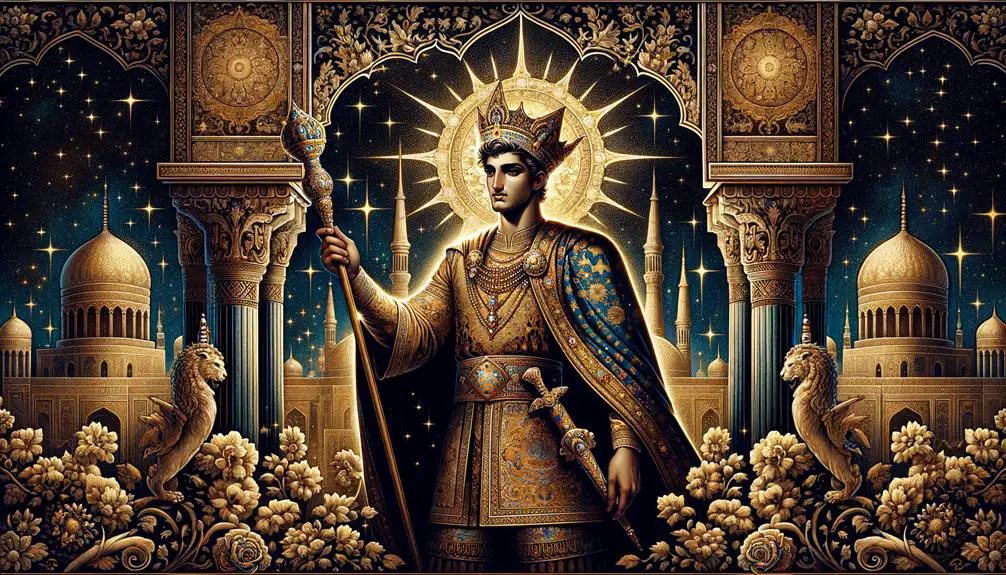
Who Was the Prince of Persia in the Bible
In the ancient texts where angels tread, the Prince of Persia stands not as a ruler of land, but as a mysterious figure woven into the fabric of spiritual warfare. You might find yourself puzzled by this character, mentioned briefly in the Book of Daniel, yet he holds a significance that belies his fleeting appearance.
This enigmatic prince represents more than a mere historical figure; he embodies the complex interplay between heavenly and earthly realms. As you ponder his role within the biblical narrative and angelic hierarchy, consider the broader implications he may have on our understanding of spiritual forces and religious thought.
Why does this figure captivate scholars and believers alike? The answer lies in exploring the depths of his biblical and historical context.
Key Takeaways
- The Prince of Persia represents a spiritual entity influencing earthly realms in the Book of Daniel.
- This figure highlights the intersection of spiritual warfare with human affairs in biblical narrative.
- Angelic hierarchy and roles are evident through the Prince's interaction with divine messengers.
- Reflects Persian Empire's cultural and theological impact on biblical themes and interpretations.
Historical Context

Understanding the historical context is crucial to grasp the significance of the Prince of Persia's mention in the Bible. You're delving into a period where the Persian Empire was a dominant force, shaping the political and religious landscape of its time. This empire's interactions with the peoples and nations within its vast territories were complex, characterized by strategies that included religious tolerance and political diplomacy. It's within this intricate backdrop that the mention of the Prince of Persia gains its full weight.
The Persian Empire's approach to religious politics was particularly noteworthy. Unlike many empires that sought to impose their own religious practices on conquered peoples, the Persians allowed a degree of religious autonomy. This policy fostered a relatively peaceful coexistence among diverse cultures and religions within the empire. However, it's important to understand that this tolerance served a political purpose. By allowing conquered peoples to maintain their religious practices, the Persian rulers minimized resistance and unrest, ensuring the stability and longevity of their rule.
In this context, the mention of the Prince of Persia in the Bible isn't merely a reference to a historical figure or entity. It's an allusion to the intricate dance of power, religion, and politics that defined the era. The Persian Empire's influence extended far beyond its military conquests, shaping the religious and political narratives of the time. As you explore the significance of this mention, you're tapping into the complex interplay between a world empire and the religious life of its subjects, a theme that resonates through the annals of history.
Biblical References
The Bible references the Prince of Persia primarily in the book of Daniel, where his role intersects with spiritual and earthly realms in a narrative that highlights the complex relationship between divine intervention and human history. This figure, though not extensively detailed, serves as a window into understanding how Persian culture and spiritual entities are portrayed within biblical texts. It's essential to analyze these references through a lens that values biblical accuracy, ensuring interpretations remain faithful to the original scriptures.
You'll find that the depiction of the Prince of Persia in the Bible isn't just a mere historical or cultural annotation. Instead, it's intricately tied to the broader theological themes that the Book of Daniel explores, such as prophecy, the sovereignty of God, and the spiritual battles that underpin human affairs. This narrative thread invites you to consider the depth of influence Persian culture had on the biblical authors and their worldview, acknowledging the interweaving of historical and spiritual dimensions.
Delving deeper into the biblical accuracy of these references, it becomes apparent that the text isn't merely recounting events but is also engaging in a sophisticated dialogue with the contemporary understandings of power, spirituality, and divine justice. This engagement with Persian culture within the biblical narrative underscores the text's historical contextuality and its theological reflections on the nature of spiritual authority and conflict.
Spiritual Warfare Explained
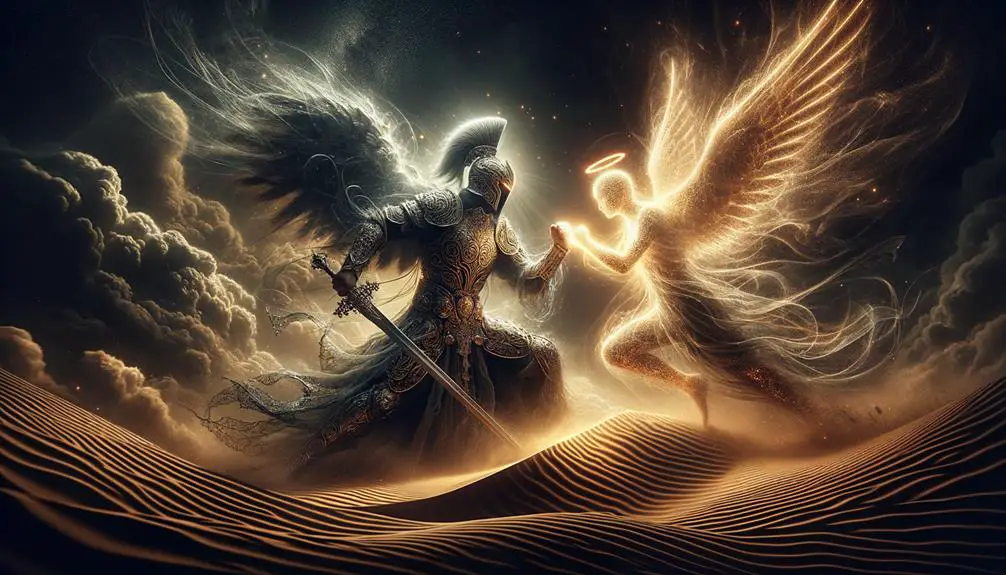
You'll find that spiritual warfare encompasses the ongoing battle between good and evil, as depicted in the Bible.
Key biblical battles offer insights into the nature of these spiritual conflicts and the entities involved.
Understanding strategies for believers equips you to navigate this unseen warfare effectively.
Defining Spiritual Warfare
In exploring the concept of spiritual warfare, it's essential to recognize it as a battle waged in the spiritual realm, involving forces of good and evil that impact both the physical and spiritual aspects of life.
This unseen conflict is marked by its influence on individuals and societies, manifesting through various forms, such as demonic possession. This phenomenon represents a direct intrusion of malevolent spiritual entities into human lives, aiming to corrupt and destroy.
However, spiritual warfare isn't without defense mechanisms. The effectiveness of prayer, for instance, stands as a pivotal strategy in combating these dark forces. It's through such spiritual disciplines that believers can protect themselves and counteract the advances of evil, emphasizing the power of faith and divine intervention in navigating this complex battlefield.
Key Biblical Battles
Throughout history, key biblical battles serve as profound examples of spiritual warfare, demonstrating how divine forces intervene in human affairs to combat evil. These skirmishes, often involving Persian tactics, showcase not only the physical but the spiritual dimensions influencing battle outcomes.
- The Battle of Jericho: A direct intervention by God, leading to the walls collapsing without conventional warfare tactics, highlighting the power of faith over Persian military strategies.
- Gideon's Victory over the Midianites: This battle demonstrates how faith, obedience, and unconventional tactics can result in overwhelming victory against numerically superior forces, bypassing traditional Persian warfare methods.
- Daniel's Spiritual Warfare: Faced with the Persian empire's influence, Daniel's struggle isn't physical but involves prayer and angelic intervention, emphasizing the spiritual battle's significance over the physical, affecting the realm's outcomes.
Strategies for Believers
Having explored key biblical battles that underscore the intersection of divine intervention and human strategy, let's now focus on how believers can engage in spiritual warfare effectively. Understanding the importance of prayer and the resilience of faith is crucial in this context.
Strategy Component |
Application |
|---|---|
Prayer Importance |
Regular, focused prayer strengthens your spiritual foundation, acting as both shield and weapon against adversities. |
Faith Resilience |
Cultivating a steadfast faith ensures you remain unshaken during trials, embodying endurance. |
Scriptural Engagement |
Immersion in scripture educates and empowers you, providing wisdom and clarity for every battle. |
Analyzing these components reveals that successful spiritual warfare hinges on a believer's proactive engagement with their faith, underpinned by prayer and a resilient trust in their spiritual journey.
Angelic Hierarchy Insights
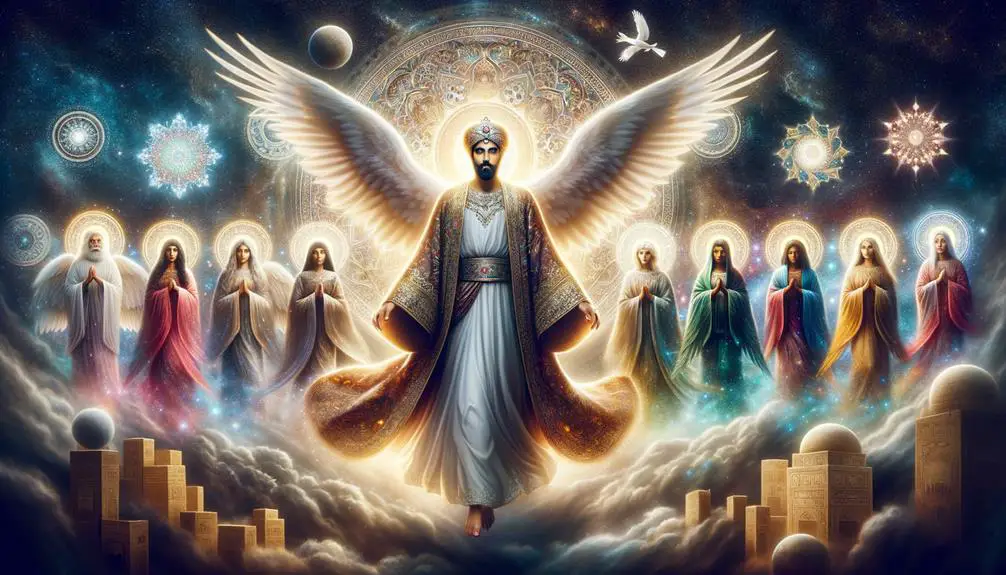
Understanding the angelic hierarchy offers insights into the complex structure of celestial beings mentioned in religious texts. This structure categorizes angels into different celestial rankings, indicating their roles, powers, and responsibilities. As you delve into the stories and mentions of divine messengers across various passages, you come to appreciate the intricate organization that governs the spiritual realm.
When considering the angelic hierarchy and its relevance to the Prince of Persia mentioned in the Bible, it's crucial to understand three key points:
- Celestial Rankings: This refers to the structured levels within the angelic realm. Each rank has specific duties and powers. The higher the ranking, the closer the angel is to the divine and the more significant their role in executing God's will.
- Roles of Divine Messengers: Angels serve as messengers between the divine and humanity. Their roles vary from delivering messages, providing guidance, to protecting individuals or nations. The Prince of Persia is an example of an angelic being with a specific territorial responsibility, suggesting a complex hierarchy that includes roles tied to geographical areas.
- Influence on Human Affairs: The hierarchical structure hints at the extent of influence these celestial beings have over earthly matters. Higher-ranked angels, such as archangels, have broader responsibilities that can affect the course of history or the fate of nations, as implied by the struggle described in the Book of Daniel.
This analytical glance into the angelic hierarchy not only enriches your understanding of the spiritual dynamics at play but also underscores the multifaceted roles that divine messengers undertake within the biblical narrative.
Interpretations and Theories
Exploring the interpretations and theories surrounding the Prince of Persia in the Bible, it's essential to consider the variety of perspectives scholars and theologians offer on this enigmatic figure. Most interpretations delve into the intricacies of Persian politics and the cultural significance of such a title during the era depicted in the biblical texts. You'll find that scholars often debate whether the Prince of Persia refers to a literal historical figure involved in the political machinations of the time or a symbolic representation of the political forces at play.
Diving deeper into the political landscape, some theorists argue that the Prince of Persia symbolizes the complex political environment that the Jewish people navigated during their exile and subsequent return. This perspective emphasizes the role of Persian politics in shaping the destiny of the Jewish people, suggesting that the figure might represent the amalgamation of political hurdles they encountered.
On the other hand, interpretations focusing on cultural significance propose that the Prince of Persia embodies the broader struggle between good and evil, reflecting the dualistic nature of Persian religious and cultural beliefs. This theory posits that the biblical narrative uses the figure of the Prince of Persia to convey deeper moral and spiritual lessons relevant to the audience of the time, transcending mere political commentary.
Regardless of the angle from which you approach it, the discussions surrounding the Prince of Persia in the Bible reveal a rich tapestry of interpretations, each shedding light on the multifaceted relationship between the biblical text, Persian politics, and cultural narratives.
Impact on Religious Thought
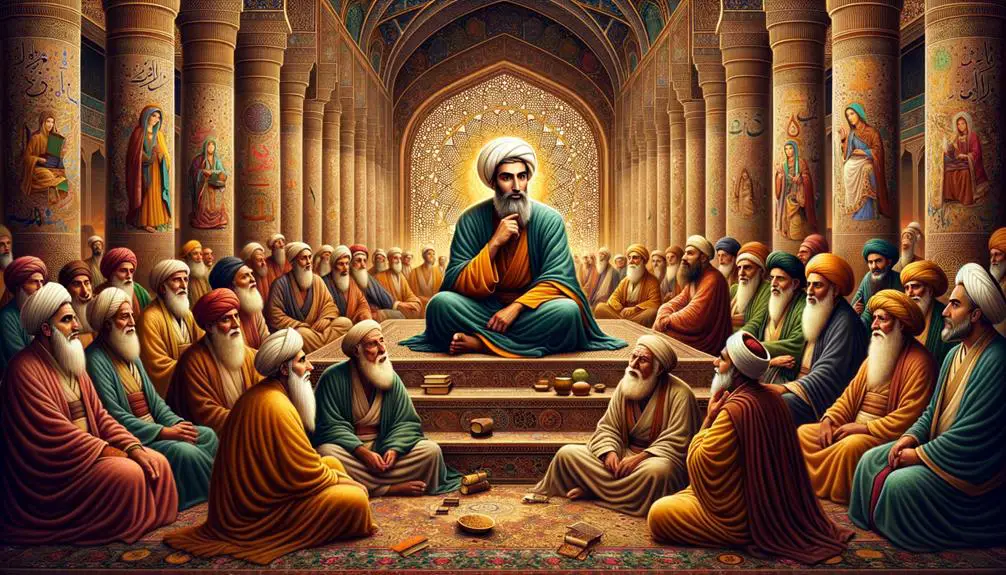
Examining the Prince of Persia's role in the Bible reveals its profound impact on religious thought, challenging and enriching interpretations of spiritual conflict and divine intervention. This figure isn't merely a historical or mythical character but serves as a pivotal element in understanding the complexities of spiritual warfare, highlighting the nuanced interactions between divine beings and human affairs. The narrative involving the Prince of Persia has spurred significant theological debates, offering a fascinating glimpse into the interplay between free will, divine providence, and the existence of spiritual entities with influence over earthly kingdoms.
The impact on religious thought can be summarized in three key areas:
- Cultural Influence: The Prince of Persia's story has permeated various cultures, influencing not just religious narratives but also art, literature, and modern media. This cross-cultural resonance has made the concept of spiritual warfare a common theme in discussions about faith, morality, and the unseen forces at play in the world's affairs.
- Theological Debates: The Prince of Persia has been central to debates on angelology and demonology within religious scholarship. Questions about the nature, power, and hierarchy of spiritual beings have been informed and enriched by interpretations of this biblical account, leading to diverse doctrinal views within Christianity and Judaism.
- Interpretative Challenges: The account challenges readers to consider the complexity of divine intervention and the role of spiritual entities in human history. It has encouraged deeper exploration into the nature of prophecy, prayer, and the spiritual dimensions influencing worldly events, fostering a richer, more nuanced understanding of biblical narratives.
In essence, the Prince of Persia's role in the Bible invites you to delve deeper into the mysteries of faith, encouraging a thoughtful engagement with the spiritual dimensions of existence.
Frequently Asked Questions
How Did the Concept of the Prince of Persia Influence Modern Media and Entertainment, Such as Video Games and Movies?
The concept of the Prince of Persia significantly influenced modern media, inspiring game mechanics and character design in video games and movies. You've seen its impact in the agile, acrobatic protagonists and intricate, puzzle-filled worlds.
It's not just about the visuals; the storytelling, rich with historical and mythical elements, has set a benchmark. This influence ensures that elements of the Prince of Persia continue to shape entertainment, blending ancient lore with contemporary gameplay and narratives.
Are There Any Existing Archaeological Findings or Historical Artifacts That Directly Reference the Prince of Persia Mentioned in the Bible?
You're likely curious if there's solid evidence, like archaeological findings or historical artifacts, that tie directly to the references of the Prince of Persia in Biblical translations. Despite extensive studies on Persian architecture and ancient texts, there's no direct archaeological proof specifically linking to this figure mentioned in religious scripture.
Scholars rely on contextual analysis and historical correlations rather than concrete artifacts to understand the depiction and significance of such entities in ancient narratives.
How Has the Depiction of the Prince of Persia Evolved in Religious Art and Literature Outside of the Canonical Texts?
As an artist paints a canvas with evolving hues, so have artistic interpretations and literary adaptations of the Prince of Persia transformed across time.
You'll find his portrayal in religious art and literature diverges significantly from its origins, reflecting changing cultural and theological perspectives.
These renditions, while rooted in ancient texts, branch into diverse depictions that invite you to explore the multifaceted nature of religious symbolism and its adaptation across centuries.
In What Ways Have Different Religious Denominations or Sects Diverged in Their Understanding or Emphasis on the Role of the Prince of Persia?
You'll find that various religious denominations have unique takes on the role of the Prince of Persia, leading to interpretation discrepancies.
These differences often spark sectarian controversies, as each group emphasizes distinct aspects of the figure's significance or moral implications.
Analyzing these divergences offers insight into how religious texts can be understood in multiple ways, highlighting the complexity of religious interpretation and the impact of cultural and doctrinal contexts on such readings.
Can Parallels Be Drawn Between the Prince of Persia and Similar Figures or Entities in Other Ancient Cultures or Religious Traditions?
You can indeed find parallels between the Prince of Persia and entities in ancient cultures through a Greek mythology comparison and cultural symbolism analysis.
Many ancient traditions depict spiritual or celestial battles, akin to the Prince of Persia's role. For instance, Greek myths often feature gods and heroes confronting adversaries, reflecting a universal theme of cosmic struggle.
Analyzing these similarities offers insights into how different cultures perceive and symbolize spiritual warfare.
Conclusion
So, after wading through ancient texts and diving deep into the spiritual DMZ, you've learned that the Prince of Persia wasn't just a swashbuckling video game character but a high-ranking angelic bureaucrat embroiled in celestial office politics. Who knew the heavenly realm had its own version of a corporate ladder?
This dive into spiritual warfare and angelic hierarchy not only spices up religious discourse but also gives 'working your way up' a whole new, ethereal meaning.

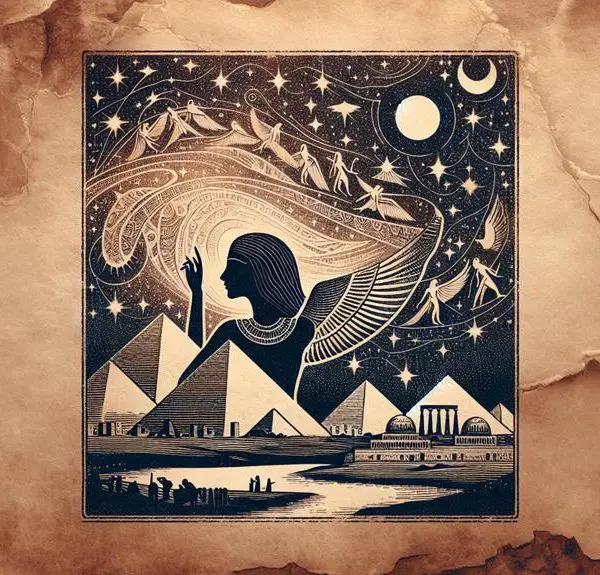
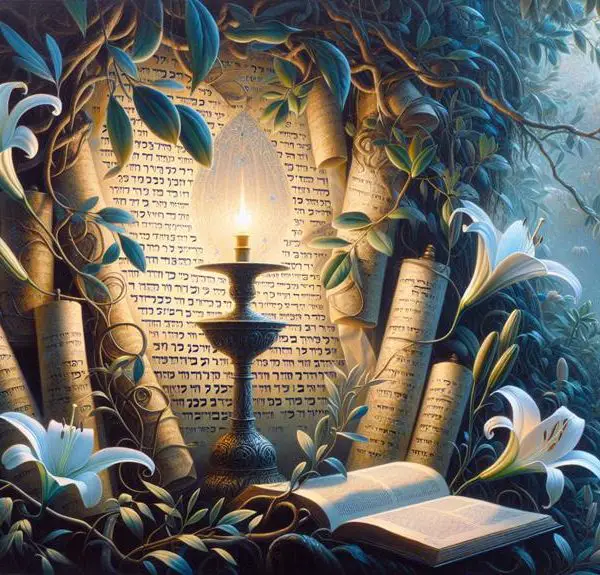
Sign up